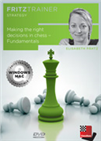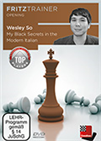A first loss in two years
The perennial favourite in US women’s events did it again. Irina Krush, an 8-time national champion, successfully defender her American Cup title in Saint Louis. For a second year in a row, she won the event by beating 13-year-old Alice Lee in the finals. Unlike last year, though, the youngster did manage to score a win over her famed opponent, as she bounced back from her loss on Friday by beating Krush in the second classical game of the match.
Playing black, Krush miscalculated on move 24, as she gave up her knight one move too early in a dynamic position.
Krush’s idea to capture on e4 with the knight is not mistaken, but before taking the pawn she needed to play the intermediate 24...Rg6, threatening mate on g2. In that line, after 25.g3 Nxe4, White does not count with the winning recourse that she used in the game — i.e. the immediate 24...Nxe4 failed to 25.Nc8, attacking the rook on d6. In this case, 25...Rg6 does not work due to 26.Ne7+, with a deadly fork.
The defending champion immediately noticed she had made a grave mistake and continued with 25...d3 — after contemplating the situation for more than 20 minutes. Notwithstanding, after 26.fxe4, Black is simply a piece down with barely any compensation.
Lee calmly converted her advantage, simplifying the position whenever she got a chance. The match would be decided in rapid playoffs.
 In a total of 6 chapters, we look at the following aspects: the right decision based on tactical factors, decisions in exchanges and moves, complex and psychological decisions in longer games and in defence.
In a total of 6 chapters, we look at the following aspects: the right decision based on tactical factors, decisions in exchanges and moves, complex and psychological decisions in longer games and in defence.
At 13, Alice Lee has two IM norms and is ranked third among US women | Photo: Saint Louis Chess Club / Lennart Ootes
Krush’s loss in the classical game was actually her first loss in any American Cup, as she had finished the 2022 edition undefeated and had yet to concede defeat this time around. It was also the first time Lee defeated the multiple US champion in a classical game.
Nonetheless, after showing great poise in the classical game, the 13-year-old crumbled under pressure in the first encounter of the playoff. The youngster faltered in a rook ending with three pawns per side, in which she had a minute structural disadvantage.
As they were following this game parallel to the Wesley So vs Hikaru Nakamura match, the commentators safely predicted that it would end in a draw. Black does have her rook on the second rank and a better pawn structure, but rook endgames have a major drawing tendency, especially with equal material on the board.
Here, Lee’s 48.Kf1 was not a mistake, but 48.h4 was perhaps a simpler way to go about securing a draw. The king would then leave the first rank via h2 and the defensive task should not be so difficult for a player of Lee’s calibre.
In the game, the youngster began to lose the thread, and an alert Krush managed to take her chance, eventually claiming a 72-move win that once again (like at the beginning of the day) left her only needing a draw to grab the title.
The final game was a nervy affair, with Krush missing some chances to score a second consecutive win in the middlegame. However, she got to make the most of her experience once the position was simplified, as she finally signed a draw from a position of strength to win the match and collect her second American Cup title.

The moment Irina Krush won the 2023 American Women’s Cup | Photo: Saint Louis Chess Club / Lennart Ootes
So bounces back, forces extra rapid match
Following Friday’s wild game — which ended with a good-looking stalemate — Wesley So decided to take the match to a rapid playoff by agreeing to a quick draw with the white pieces. The strategy worked out well, as he won the two 25-minute games that followed to remain in contention for the title.
Due to the double-elimination format, Hikaru Nakamura, who had not lost a single match prior to this one, will get a second chance to win the tournament on Sunday.
 The Italian Game is considered a sound but quiet opening without early trades, giving rise to rich positions where plans are more important than forced variations. So shows black's plans on this DVD.
The Italian Game is considered a sound but quiet opening without early trades, giving rise to rich positions where plans are more important than forced variations. So shows black's plans on this DVD.
In good spirits before one of their Saturday’s games — Hikaru Nakamura and Wesley So | Photo: Saint Louis Chess Club / Lennart Ootes
So outplayed Nakamura in what turned out to be a very tense first game in the playoffs. Only needing a draw with black in the next encounter, the Filipino-born star found a remarkable move out of the opening to get in the driver’s seat.
17...Bf3 is not the computer’s first line, but it is a great move under the circumstances. If White grabs the piece with 18.gxf3, there is 18...Qg5+ 19.Ng3 Bxg3, and White is forced to agree to a perpetual if he does not want to lose the game.
Nakamura naturally rejected this alternative and went for 18.Ng3 instead. In the ensuing battle, White was by no means without chances of fighting for a win, but it was apparent that the opening had been a big psychological win for So.
Forced to win to keep the match going, Nakamura ended up playing imprecise moves in the endgame, eventually allowing his opponent to grab a second consecutive win — and overall match victory. Thus, the two strongest performers of the event (and two of the very best players in the world) will play a third match in a week to decide who wins the 2023 edition of the American Cup.

Right after Hikaru Nakamura resigned the second game of the rapid playoffs | Photo: Saint Louis Chess Club / Lennart Ootes
Links
























